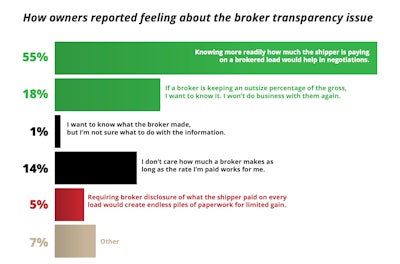The Mid-America Trucking Show saw no shortage of news from federal regulators and truck beauty contest winners, but under the surface lurked tensions between rival camps of owner-operators on the issue of broker transparency. They finally boiled over near the end of a talk delivered by trucking guru and past Overdrive contributor Kevin Rutherford.
On one side of the broker transparency issue stands Rutherford. Flanked by Truckstop Chief Relationship officer Brent Hutto, Rutherford at MATS rebooted his long-running Certified Master Carrier program in a live format -- for those who don't remember it, it's an owner-op academy of sorts, taking place over days with intensive sessions aimed at delivering the ins and out of bootstrapping a trucking business, no matter the business or regulatory climate.
Preaching a radical kind of personal ownership over all things business, Rutherford and his followers don't think brokers being forced to disclose their rates would really help trucking, and indeed warn that it could backfire on carriers, ushering in a "race to the bottom" on rates.
In the other corner stands Dakota Springfields, who chalked up a win when, in November, she was successful with FMCSA's help in a bid to compel TQL to disclose the rate the shipper paid on a load of ice cream.

Springfields said it exposed TQL making a 44% margin on that load, and that more transparency would reveal more well-above-average takes from intermediaries, making it an urgent action item for regulators.
The in-person conflict was little bit more spectacular than, say, a pot boiling over on the stove. It happened after Rutherford's CMC program, at a talk delivered as part of the MATS Pro Talks series. Though Springfields at times heckled the speakers onstage, and Rutherford eventually did excuse himself a few minutes earlier than scheduled, both sides remained measured, the debate academic, you might say -- mostly, that is.
[Related: Broker margins, rates data, transparency: What owner-operators really think]
The 'broker transparency' debate
Judging by Overdrive's early-year survey, more owner-operators seem to agree with Springfields than Rutherford. The survey followed close on the heels of reporting around broker margins and trust in the major freight-rates indices. The survey asked about transaction transparency in the context of the Federal Motor Carrier Safety Administration's pursuit of a potential rulemaking that could go so far as to require automatic disclosure of transaction records after any load, including what the shipper paid.
Fully 73% of survey respondents said either that they could benefit from disclosure of the shipper's rate on a brokered load with increased leverage in negotiations, or that disclosure could help them avoid brokers who take too big of a cut.
 Download the full report from the survey via this link.
Download the full report from the survey via this link.
Just 20% of respondents came out on the other side of the debate -- most indicated they didn't care what the broker made as long as they were well-compensated.
Springfields and a variety of trucking groups, including the Owner-Operator Independent Drivers Association and the National Owner Operators Association, have called out FMCSA for dragging its feet on the transparency rulemaking -- OOIDA said the most recent delay on the FMCSA regs calendar, pushing the issue to October this year, was simply "BS."
Kevin Rutherford, for his part, focuses mostly on how owner-ops can "live their best lives," he said, and less on what FMCSA should or shouldn't mandate.
Nonetheless, he argues with advocates on the other side of the transparency debate on Twitter/X, and those conversations got every bit as wacky as you might expect from a prolonged, entrenched internet argument before he blocked most of them shortly after MATS.
At MATS on the first day of the show, March 21, the arguments jumped from the screen to the stage.
What happened at MATS
After a long morning of heading up the CMC workshops, packed with business advice for owner-ops, Hutto and Rutherford kicked off their Pro Talks session. The "Carriers -- Stay Alive and Thrive" talk focused on how to choose the right freight and control costs, while also veering into insight on stress and mind-set management.
Rutherford, with 40 years experience in and around trucking, illustrated how his early failures as a small fleet owner-operator forced him to radically reconsider his approach and take total ownership of his business and mindset. He spoke about his "superpower," his ability to learn new things, reading two books a week and more.
It was near the end of the event when things began to veer off course.
"If someone says they're not succeeding in business," he said, "and the reason why is 'it is not me,' then you’re wrong. If you are saying I’m not doing good because the rates are bad, then get out of business because the rates are always bad. If you're saying I’m not doing well because the brokers are ripping me off, then get out of business."
Rutherford continued pushing, then.
"I make it my responsibility" to succeed, he said. "If I don't, all I can do is bitch about it like everyone else does. I know lots of people in this business are always suffering, never happy and it’s always someone else’s fault. Now I'm seeing the attitude of 'I bought a truck, I’m entitled to a profit.'
"Just get the hell out of business."
Rutherford took time to elaborate, noting what he's against is businesspeople making decisions driven principally by emotion, that he wanted to stress the importance of truck owners focusing on the few things they could control.
"We can’t control the economy, we can’t control regulations," he said, "but we can control how we react to it. That's the beauty of being an owner-operator."
[Related: Calculate any load's cost in relation to time, not just miles]
Truckstop's Brent Hutto addressed some murmurs in the crowd and moved on to a Q&A. Springfields' hand shot up.
"I received 56% of the load when I received my broker transparency," Springfields started to say, referring to her encounter with TQL and the FMCSA. "I do believe brokers are taking more than that," she continued before she was cut off.
"You know what I say to that?" said Rutherford. "Congratulations to the broker. You did a hell of a job. I don't care if it was 84%."
Hutto interjected, asking Springfields if there were any brokers she did in fact trust.
"I do," she said.
"There are more than 10,000 brokers you can work with," said Hutto.
"But only a few at the top are controlling most of these lanes," Springfields shot back.
At this point, Rutherford excused himself. "I know myself, and the next statement will not be pleasant," he said, leaving the room.
Hutto stressed that Springfields should work with Truckstop to find suitable brokers, that the industry is vast and owner-operators and small carriers can succeed, whether transaction transparency is enforced in a meaningful way or not.
After the session, Springfields said she raised the transparency issue because she knew Rutherford was against it. "How do you succeed without broker transparency?" she asked. "I wanted to know why they’re against it. Is anyone else fighting, or is there just a few of us? There are lots of people -- anyone that I meet at a truck stop, they want to fight for broker transparency but they're so scared."
Springfields herself has reported being blacklisted by brokers after requesting transparency. She said that after Overdrive chronicled her back and forth with TQL, other owner-operators have pursued broker transparency with her help, and that she's open to helping drivers work with FMCSA to enforce the disclosure requirements in 49 CFR 371.3.
"When I’m working like a donkey and I’m only making enough money to pay for a cell phone bill, and you’re hanging the phone up on me because I’m asking questions like, 'Is there detention?', and you're saying, 'This job is not for you then,'" her fight takes on new urgency, she said.
Rutherford, too, remained staunch in his position in the aftermath. "When I explained to her what broker transparency really meant, she didn’t really get it," he said. "It’s not what she thinks it is."
In addition to feeling an automatic records disclosure requirement on brokers would be a "race to the bottom" for rates, "I could give 15 other reasons why broker transparency is a bad idea," he added. "I probably did mock them, and I'd do it again, but I call this tough love," not mockery.
No hard feelings, in the end. Springfields said she's inspired by Rutherford, even if she disagrees with the transparency issue. "I need to read more books," she joked.
Twitter beefs, disagreement, debate, in the final analysis, don't stop the world from spinning. That's especially true when both sides get back to business.
Where do you stand? Weigh in on this question:











